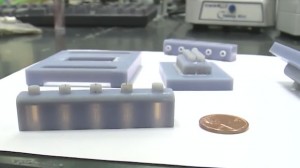NEW YORK (Reuters Health) – In patients with unresectable pancreatic cancer, the combination of gemcitabine and a novel cationic liposomal formulation of paclitaxel called EndoTAG-1 substantially prolongs survival compared to gemcitabine therapy alone, according to a study presented this week.
EndoTAG-1, developed for the treatment of solid malignancies, targets activated negatively-charged endothelial cells of tumor blood vessels, Dr. Matthias Löhr of the Karolinska Institute, Stockholm, and colleagues explain in materials for the European Society for Medical Oncology’s (ESMO) 11th World Congress on Gastrointestinal Cancer in Barcelona, Spain.
In a phase II study, the research team randomized 200 patients with locally advanced or metastatic pancreatic cancer to first-line treatment with weekly gemcitabine (1000 mg/m²) and twice weekly EndoTAG-1 at three different dose levels (11, 22, or 44 mg/m²) or to gemcitabine alone.
“The key finding is that the median survival time is dramatically prolonged in patients with advanced (inoperable) pancreatic cancer,” Dr. Löhr told Reuters Health.
Tumor response after 7 weeks, according to RECIST (Response Evaluation Criteria in Solid Tumors), showed a higher proportion of patients with non-progressive disease in the combination arm (60%, 65%, and 52%, respectively, for gemcitabine plus low, medium, and high doses of EndoTAG-1) than in the gemcitabine only arm (43%).
Median progression-free survival, the researchers report, was “markedly higher” with combination therapy than monotherapy. Median PFS was 18, 20, and 19 weeks, respectively, in the gemcitabine/EndoTAG-1 low, medium, and high dose groups, compared with 12 weeks in the gemcitabine monotherapy group.
Median overall survival was 7.2 months with gemcitabine alone versus 8.4, 8.7, and 9.4 months with gemcitabine plus low, medium, and high dose EndoTAG-1. Twelve-month survival rates were 17% with gemcitabine alone versus 22%, 36% and 33% for gemcitabine plus low, medium and high dose EndoTAG-1.
The study team also noted a dose-dependent improvement in pain scores on a standard quality of life questionnaire during treatment in the gemcitabine plus EndoTAG-1 groups. “Adverse events related to combination therapy were predominantly chills and pyrexia of mild to moderate intensity,” the authors report.
Based on these data, Dr. Löhr told Reuters Health, the team is planning a phase III study of EndoTAG-1, which is being developed by German biotech company MediGene.




